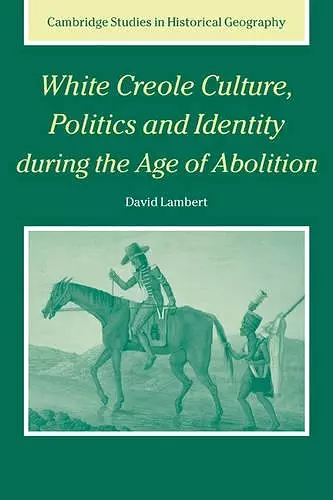White Creole Culture, Politics and Identity during the Age of Abolition
Format:Paperback
Publisher:Cambridge University Press
Published:16th Dec '10
Currently unavailable, and unfortunately no date known when it will be back
This paperback is available in another edition too:
- Hardback£100.00(9780521841313)

This book explores the articulation of white creole identity in Barbados during the age of abolitionism.
This book considers what it meant to be a white Briton in the West Indian colony of Barbados during the age of abolitionism. David Lambert offers a unique perspective into the consequences of these tumultuous times for a colony once renowned as the most loyal in the British Empire.David Lambert explores the political and cultural articulation of white creole identity in the British Caribbean colony of Barbados during the age of abolitionism (c.1780–1833), the period in which the British antislavery movement emerged, first to attack the slave trade and then the institution of chattel slavery itself. Supporters of slavery in Barbados and beyond responded with their own campaigning, resulting in a series of debates and moments of controversy, both localised and transatlantic in significance. They exposed tensions between Britain and its West Indian colonies, and raised questions about whether white slaveholders could be classed as fully 'British' and if slavery was compatible with 'English' conceptions of liberty and morality. David Lambert considers what it meant to be a white colonial subject in a place viewed as a vital and loyal part of the empire but subject to increasing metropolitan attack because of the existence of slavery.
Review of the hardback: 'White Creole Culture is an exemplary cultural history, with its in-depth exploration of individuals and moments, its interdisciplinary range, its utilisation of a range of texts from court cases and poetry to rebel flags and the colonial press, and its eloquent account of the conjunctural formation of white colonial identities across metropole and colony.' Journal of Historical Geography
Review of the hardback: 'Lambert is the first writer since Edward Braithwaite to examine in depth how whites in the Caribbean developed an embryonic white Creole … The major virtue of Lambert's sensitive delineations of white identities is that it will force historians to pay more attention to divisions within the master class and to how whiteness, and by implication blackness, were contested discourses with significant political implications.' English Historical Review
Review of the hardback: '… theoretically stimulating and empirically rich.' H-HistGeog
ISBN: 9780521172394
Dimensions: 229mm x 152mm x 15mm
Weight: 380g
258 pages